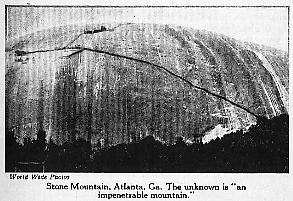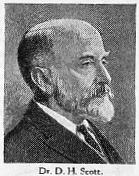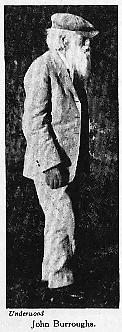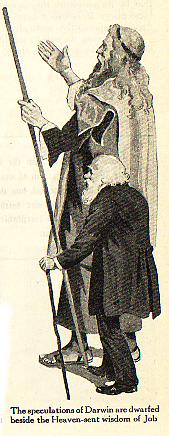|
The Predicament of Evolution
by George McCready Price (1870-1963)
This was ©1925 by Southern Publishing Assoc.
Chapter Three -
The Biological Blind Alley
THE present situation in the biological
sciences is so peculiar that I shall not depend upon my own unsupported
statements. I shall let some of the leading scientists themselves state the
facts. In this way the reader can judge for himself regarding the predicament in
which the evolution doctrine is today. I shall begin with some men who are
advocates of Mendelism; for, strange to say, there are some scientists who are
almost violently opposed to the use of Mendelism in studying evolutionary
problems.
Bateson, in his Australian address before the
British Association in 1914, said:
"The student of genetics knows that the time
for the development of theory is not yet. He would rather stick to the
seed-pan and the incubator. . . . Every theory of evolution must be such as to
accord with the facts of physics and chemistry, a primary necessity to which
our predecessors paid small heed. For them the unknown was a rich mine of
possibilities on which they could freely draw. For us it is rather an
impenetrable mountain out of which the truth can be chipped in rare and
isolated fragments."
Seven years later, in his Toronto address before the American Association, he
was even more explicit.
"We cannot see how the differentiation into
species came about. Variation of many kinds, often considerable, we daily
witness, but no origin of species. . . . Meanwhile, though our faith in
evolution stands unshaken, we have no acceptable account of the origin of
'species.'"—Science, Jan. 20, 1922.
Bateson's Act of Faith
Elsewhere in this same address Bateson dwelt
upon the fact that he could still believe in the general idea of evolution "in
dim outline," and only by a sort of act of faith in the testimony he supposed
has been furnished us by geology,— a feature which will be considered later. But
he proceeded to say:
"That particular and essential bit of the
theory of evolution which is concerned with the origin and nature of
species, remains utterly mysterious. We no longer feel as we used to do,
that the process of variation, now contemporaneously occurring, is the
beginning of a work which needs merely the element of time for its completion;
for even time cannot complete that which has not yet begun."
| Still more recently Dr. Bateson has
expressed his wonder at the opponents of Mendelism, and has told them that
they have been expecting too much of this new method of experimental
breeding. "It has not given us the origin of species"; but "it has closed
off a wrong road," along which the evolutionists were trying to follow up
the trail. The two things that we cannot explain are (1) those very
characters that make one species differ from another, and (2) the reasons
why living things are so well adapted to their surroundings and their needs,
both in respect to their various organs and habits and also as entire units.
As he himself expresses it regarding these two points, "we do not understand
specific differences, nor can we account for the adaptative mechanisms. Was
it to be expected that we should?" The one very important result that modern
breeding experiments have reached is to settle once for all that the various
transferable characters brought to light in these experiments "do not
culminate in specific distinctions." This is the "wrong road" which
Mendelism "has finally closed off." And he proceeds to say: |

|
"I notice that certain writers who conceive
themselves to be doing a service to Darwinism, take thereupon occasion to say
that they expected as much, and that from the first they had disliked the
whole thing. I would remind them that the class of evidence to which we were
appealing was precisely that to which Darwin and every other previous
evolutionist had appealed."— Nature, May 10, 1924.
Old Theories Questioned
But Bateson, while one of the most prominent
biologists of the world, is not the only one who is expressing these sentiments.
Dr. D. H. Scott, the botanist, in his address before the British Association in
1921, gave us the following:
|

|
"It has long been evident that all those
ideas of evolution in which the older generation of naturalists grew up have
been disturbed, or, indeed, transformed, since the re-discovery of Mendel's
work and the consequent development of the new science of genetics. Not only
is the 'omnipotence of natural selection' gravely impugned, but variation
itself, the foundation on which the Darwinian theory seemed to rest so
securely, is now in question.
"The small variations, on which the
natural selectionist relied so much, have proved, for the most part, to be
merely fluctuations, oscillating about a mean, and therefore incapable of
giving rise to permanent new types. . . . The mutations of De Vries, though
still accepted at their face value by some biologists, are suspected by
others of being nothing more than Mendelian segregates, the product of
previous crossings; opinion on this subject is in a state of flux. In fact,
it is clear that we know astonishingly little about variation. ... At
present all speculation on the nature of past changes is in the air, for
variation itself is only an hypothesis, and we have to decide, quite
arbitrarily, what kind of variations we think may probably have occurred in
the course of descent. . . . It may be that the theory of natural selection,
as Darwin and Wallace understood it, may some day come into its own again.
..."
|
A
Generation that knows not Darwin
"For the moment, at all events, the
Darwinian period is past; we can no longer enjoy the comfortable assurance,
which once satisfied so many of us, that the main problem had been solved —
all is again in the melting-pot. By now, in fact, a new generation has grown
up that knows not Darwin." —Nature, Sept. 29, 1921.
It is true, Scott goes on to say that he cannot get away from the general idea
of evolution somehow, "even if we hold it only as an act of faith"; for he
thinks that the evidence of.the fossils is still "unshaken." However, in his
still more recent book, "Extinct Plants and Problems of Evolution"
(1924), he seems to have lost faith even in much of the supposed value of the
fossil evidence. This subject of geology and the fossils will be discussed in
Chapter V. Here it may be sufficient to give the words of some eminent
authorities as to the value of fossil evidence in helping to trace out lines of
descent for the various animals and plants.
The following is the opinion of J. P. Lotsy,
the Holland botanist:
"Phytogeny, e. g., reconstruction of what
has happened in the past, is no science, but a product of fantastic
speculations."—"Evolution by Means of Hybridization" (1916), p. 140.
I agree with this statement with all my heart. And it only adds to its force
when Lotsy proceeds immediately to say:
"Those who know that I have spent a
considerable part of my life in efforts to trace the phytogeny of the
vegetable kingdom, will know that this is not written down lightly; nobody
cares to destroy his own efforts."—Ibid.
An Illusory Vision
|

|
A. G. Tansley, in his address before the
Liverpool meeting of the British Association (1923), indicates that the
recent history of evolution makes the search for common ancestors among
plants "literally a hopeless quest, the genealogical tree an illusory
vision."—Nature, March 8, 1924.
Also Prof. A. C. Seward, of Cambridge
University, tells us that "the present tendency is to discard the
old-fashioned genealogical tree with its wonderful diversity of branches,"
as a method of representing the course of evolution; for he says that "a
student who takes an impartial retrospect soon discovers that the fossil
record raises more problems than it solves." — Nature, April 26,
1924. |
No wonder F. O. Bower, Professor of Botany in
the University of Glasgow, in commenting on these and similar remarks, says that
"at the present moment we seem to have reached a phase of negation" with respect
to the attempts of the botanists to trace out lines of evolutionary descent. And
he adds: "I believe that a similar negative attitude is also to be found among
those who pursue zoological science."—Nature, March 8, 1924.
These remarkable statements, be it noted, are
not from obscure men, nor are they fished up from the musty science of two or
three generations ago. They are from men who are in this year of grace, 1925,
standing in the very forefront of modern progress.
Darwin's
Theory Shattered
If now we return to the strictly biological
phase of the subject, we have the statement of Vernon Kellogg that since the
time of Charles Darwin, "the two most important explanations of evolution
current in Darwin's time; namely, Lamarckism, or the inheritance of acquired
characters, and Darwinism, or natural and sexual selection, have been weakened
rather than strengthened as sufficient causes of evolution."
| Kellogg goes on to say that Lamarck's
theory was "a plausible explanation, but one wholly dependent upon the
'inheritance of acquired characters,' which, unfortunately, does not seem to
happen. . . . Acquired characters, in the Lamarckian sense, are not
inherited." — New Republic, April 11, 1923. The Darwinian theory, he
further says, was "also a plausible explanation, but also much weakened, if
not shattered, by the results of modern biological study."
Darwin, said John Burroughs, "has already
been shorn of his selection theories as completely as Samson was shorn of
his locks."—Atlantic Monthly, Aug., 1920, p. 237. Also we know that
Lamarckism was disposed of thirty years ago by the work of August Weismann.
And now Mendelism, in the hands of thousands of students of genetics in all
parts of the civilized world, seems to have administered the finishing blow
to any rational hope of explaining the origin of the larger groups of plants
and animals, though it has helped wonderfully in pointing out an easy
explanation of the great variety of the smaller groups, the "species" and
sub-species, all over the world, and has also pointed out how all this
multitudinous variety might have come about in a very short time, from a
comparatively few original types, and without the necessity of supposing any
long ages in which this differentiation was accomplished.
|

|
No
Abstract Life
In speaking here of the "larger groups," I am
not referring simply to the phyla, the classes, and the orders, but to the
families and the great sub-families. These, it seems to me, are the
original biological units. Regarding their origin, I can see nothing but a real
original creation, just as we must postulate a real creation for the origin of
life. As I have pointed out elsewhere, there is no such thing as "life" in the
abstract; we know of life only in the shape of living individuals. And in
speaking of the origin of the first forms of life we must postulate the
simultaneous beginning of a sufficient number of diverse forms of both plants
and animals to make a balanced web of life, so that under the principle of
interdependence a sufficient variety would be in existence to make a balance
among all the various forms. These original groups, which must have been
simultaneously started at some one time, in order to insure the continuance of
the organic world as a going concern, could not, it seems to me, have been
anything less than the families.
It is interesting to note that Dr. H. B.
Guppy, the English botanist, advocates almost the very same thing. This view, as
stated and indorsed by Dr. J. C. Willis, in his recent book "Age and Area"
(1922), is that: "Evolution did not proceed from individual to variety, from
variety to species, from species to genus, and from genus to family, but
inversely; the great families and genera appearing at a very early period, and
subsequently breaking up into other genera and species."—Page 221.
J. P. Lotsy, in his cleverly written and racy
volume, has shown how much can be explained on the principle of hybridization.
If we put this with the theory of Guppy and Willis, and with all that we have
learned about Mendelism, it seems to me very easy to account for all our present
diversity of plants and animals. Only, we must suppose a real creation for all
the great original families, both of the plants and of the animals.
Says D. H. Scott, in his latest book, "We know
nothing whatever of the origin of the angiospermous families, so the field is
open to speculation."—"Extinct Plants and Problems of Evolution," 1924,
p. 217. No; not to speculation, but to a belief in a real creation, as described
in the first chapter of the Bible.
For if this is true of all the angiosperm
plants, it is just as true of all the other families of the plants, and equally
true of the family types among the animals.
The absolute necessity for such a primal
creation will appear more evident after we have considered the modern
discoveries in geology, which will be presented in Chapters V and VI.
Preferring
Speculation to Experimentation
Before closing this chapter it will be well
for us to look briefly at the two opposite views regarding Mendelism. The one
side are saying in a mournful tone that Mendelism has proved a sore
disappointment, so far as helping to a better understanding of organic evolution
is concerned.
As an example of this side, we may take the following from Prof. E. W. MacBride:
|

|
"I well remember the enthusiasm with
which the Mendelian theory was received, when it was introduced to the
scientific world in the early years of this century. We thought that at
last the key to evolution had been discovered. As a leading Mendelian put
it, whilst the rest of us had been held up by an apparently impenetrable
hedge; namely, the difficulty of explaining the origin of variation,
Mendel had, unnoticed, cut a way through. But, as our knowledge of the
facts grew, the difficulty of using the Mendelian phenomena to explain
evolution became apparent, and this early hope sickened and died. The way
which Mendel cut was seen to lead into a cul-de-sac."—Science Progress,
Jan., 1922, pp, 255, 256.
The article from which this excerpt is taken was written in criticism of
some previous ones by Julian Huxley. Recently Professor Huxley had an
article in Nature, in which he pays his compliments to the opponents
of Mendelism as follows:
"It is a matter of constant surprise why
many who profess themselves Darwinian of the Darwinians should not only
not avail themselves of the new tool [Mendelian breeding], but also evince
a positive hostility to it. The new principles are, indeed, the only tool
we at present possess which is capable of putting evolutionary theories to
experimental test. Yet, with a few honorable exceptions, most taxonomists
and 'evolutionists' prefer to stick to speculative methods—speculative
because incapable of being tested either by experiment or by calculation—
and make no attempt to use the new principles in experimental attack— or,
for that matter, even in interpretation." — Nature, April 12, 1924.
|
There we have the whole present situation.
Certain men who are intensely interested in trying to prove organic evolution
complain that Mendelism has led them only into a cul-de-sac, a blind
alley; and they repudiate all breeding tests, preferring to "stick to
speculative methods," which are "incapable of being tested either by experiment
or by calculation." The advocates of Mendelism say, on the other hand, that this
new method of experimental breeding is "the only tool we at present possess
which is capable of putting evolutionary theories to experimental test." But I
think the enemies of Mendelism are wise. They have tried Mendelism as a key to
organic evolution, and have found that by its assistance they are only running
up a cul-de-sac, a blind alley. Hence they have become cautious; they
prefer to "stick to speculative methods."
Shall we not do well to say that modern
biology is proving the utter bankruptcy of the theory of organic evolution?
"We cannot see
how the differentiation into species
came about.
Variation of many kinds, often consideraable,
we daily witness, but no origin
of species ... Meanwhile,
though our faith in evolution
stands unshaken, we have no
acceptable account of the origin
of 'species.'" - Bateson
|




